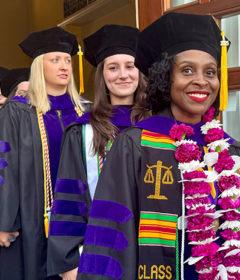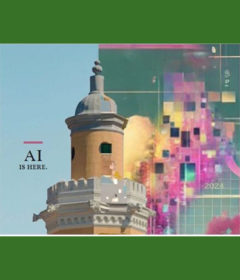Stetson Law: Falsely Convicted for Nearly 24 Years, JJ Velazquez Urges Reform
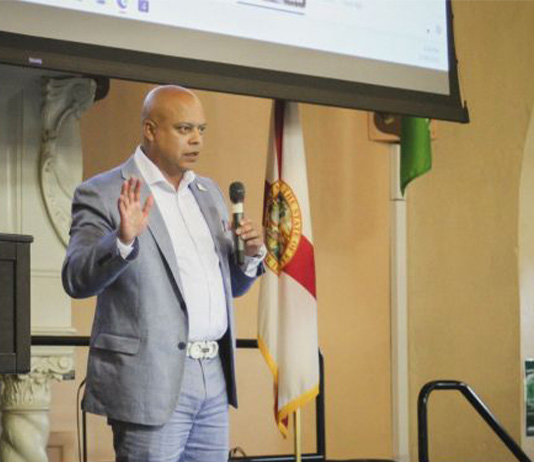
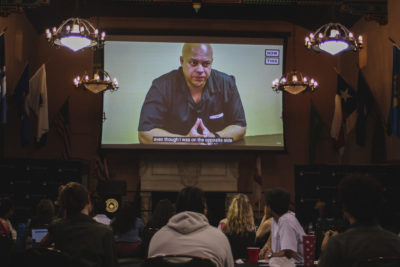
A young father of an infant and a toddler, Jon-Adrian “JJ” Velazquez walked into a New York City police station in 1999 thinking he was helping solve a murder.
His father had been a police officer, and Velazquez trusted the system. Plus, he was on the other side of town when the crime occurred.
“It was the last choice I made as a free man,” Velazquez said.
What ensued were more than two decades in prison fighting his incarceration at Sing Sing Correctional Facility — and not knowing if he would ever experience freedom again.
Now a vocal advocate for criminal justice reform, Velazquez spoke March 18 at Stetson Law at an event relaunching the Stetson Law Innocence Initiative, a student organization guided by Professor Judith Scully, co-director of Stetson Law’s Social Justice Advocacy Concentration.
Scully said that conservative estimates place the number of wrongfully incarcerated individuals in the United States between 30,000 and 170,000.
“Many people in prison are innocent, and they are locked up behind bars,” Scully said. “As part of the legal profession, we are responsible for addressing this problem.”
Harrowing Experience Inspires Action
Sentenced to 25 years to life, Velazquez never stopped fighting for his freedom.
Early on in his sentence, his fight led him to contact Dan Slepian, an investigative journalist whose work has helped overturn multiple wrongful convictions. Slepian’s work ultimately helped prove Velazquez’s innocence.
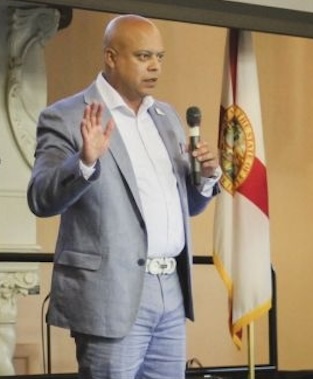
Still, it took years for Velazquez’s clemency application to receive the governor’s signature — it was one of the last things outgoing New York Gov. Andrew Cuomo signed before he left office. On August 17, 2021, after nearly 24 years in prison for a crime he did not commit, Velazquez was granted clemency. On September 9, 2021, he was released.
His efforts to fight the systemic issue of wrongful incarceration — beyond just his own — began when he was still behind bars with projects like Voices from Within, a multimedia initiative that explores the criminal justice system from the perspective of the incarcerated. As national program director for the Frederick Douglass Project for Justice, he now advocates for criminal justice reform. It’s a mission that brought him to the Oval Office not long after he left Sing Sing.
“I feel like I was placed in prison for a purpose,” Velazquez said. “And while I’d never raise my hand and volunteer to do that time all over again, I won’t change what happened, either. What I’ve learned is instrumental to help change this country in the future.”
Advice for Students
Calling wrongful conviction “the worst nightmare any person in this world can face,” Velazquez said such occurrences not only affect individuals incarcerated for crimes they didn’t commit, but also families and entire communities.
“All of us, in some way, form or fashion, help each other get through the day,” he said. “And when you start taking those members out of the community, what you’re doing is fracturing your community. And if you fracture it enough, it can break.”
While advocating for systemic change is critical, Velazquez said law students should look to their own work as they seek to transform society — and practice listening to their own instincts when defending a client or, as prosecutors, not letting the pursuit of convictions get in the way of doing what is right.
“We’re amenable to peer pressure. We’re amenable to whatever society believes success is,” Velazquez said. “As lawyers, don’t allow a culture to change who you are.”
Note: This event was a joint effort between the Innocence Initiative and the Social Justice Advocacy Concentration program. It was made possible with the support of Stetson Law’s Center for Excellence in Advocacy. The student organizations Future Lawyers for Advocacy and Philanthropy (FLAP) and the Public Service Fellows also co-sponsored the event.
-Kate Bradshaw

